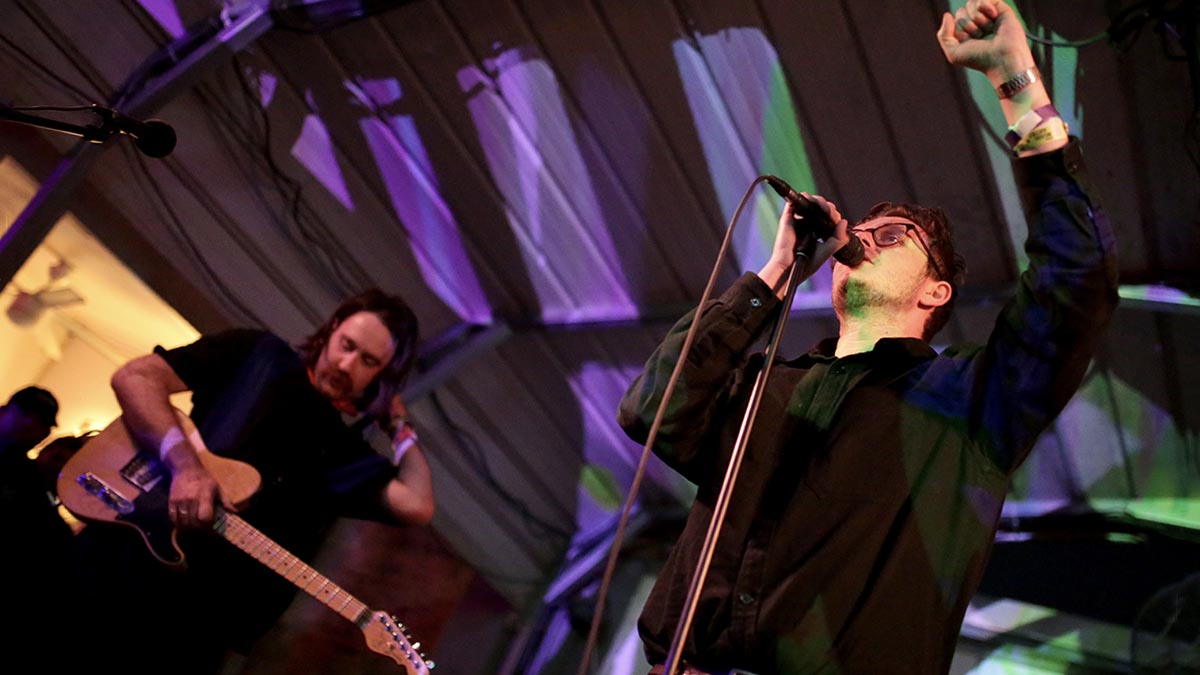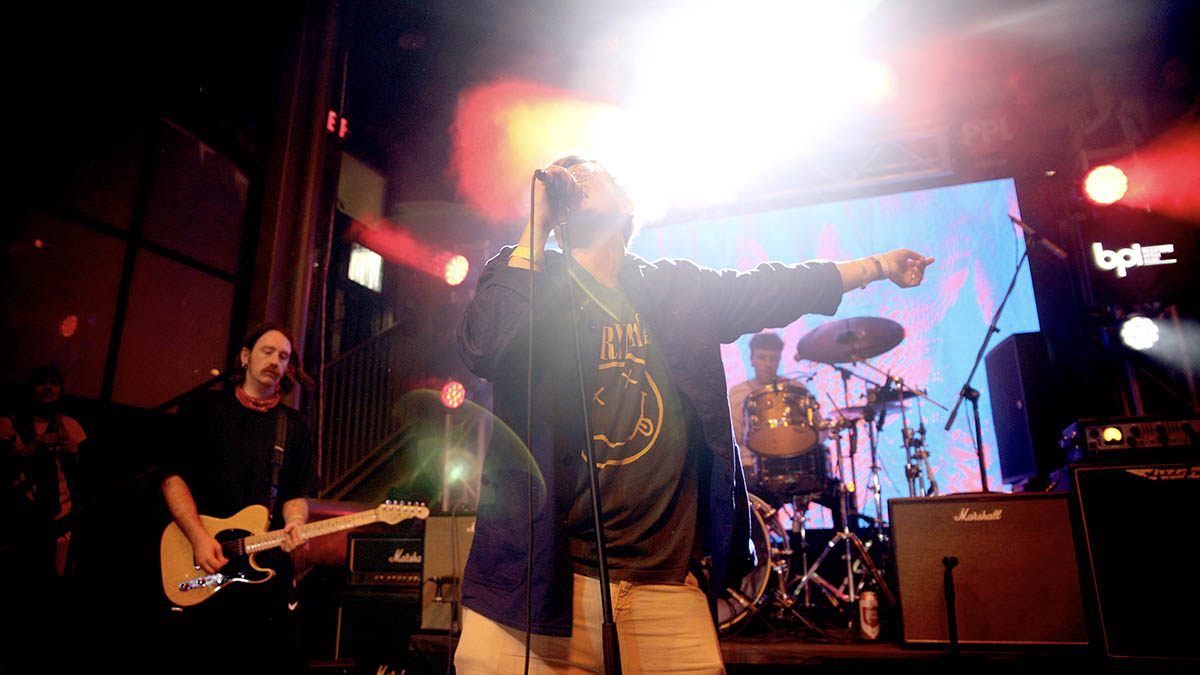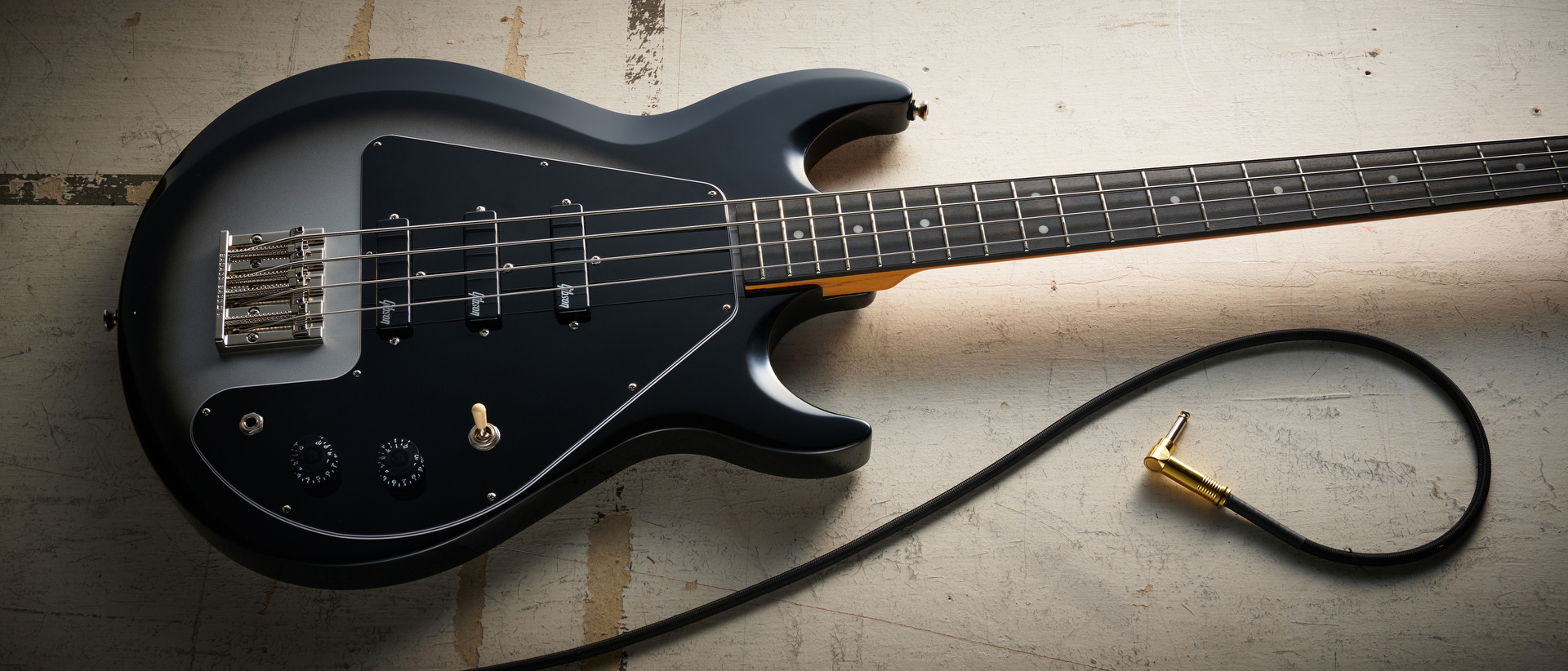Yard Act's Sam Shipstone and James Smith trace the origins of their unconventional post-punk sound
How observational lyricism and a “broken and cheap-sounding” guitar tone made Yard Act the most talked-about band in the UK

All the latest guitar news, interviews, lessons, reviews, deals and more, direct to your inbox!
You are now subscribed
Your newsletter sign-up was successful
Chances are, by the time you read this, you will have heard a lot about Yard Act. The Leeds-based post-punk quartet’s debut The Overload is one of those rare albums that feels universally anticipated across the pop-cultural firmament, showcasing a sound with the energy and clarity of purpose to meet our present moment, to help us make sense of it.
Vocalist James Smith delivers his observational verse with an antic verve, telling everyday stories of everyday people, their foibles and prejudices. Smith’s vocals are delivered in an undiluted Yorkshire brogue.
This could be spoken word but it’s not; underneath you have a propulsive rhythm from drummer Jay Russell and a bassline from Ryan Needham that sits high in the mix, directing traffic, leaving room for Sam Shipstone to add light and shade on guitar.
If it wasn’t for Smith’s accent, there are moments when you might swear Yard Act were a New York concern, a decades-late echo of the East Village no wave scene, with that beat holding the leash on skronky, treble-forward electric guitar tones, funk guitar rhythms, and spider-ish melodies that crawl off Shipstone’s fingerboard to augment the mood.
“The Yard Act sound is very British, but when I think about what my influences would have been on this record, they’re nearly all American,” Sam says. “I was thinking of guitarists who I really dig, and so many of them are from New York. I come from a hardcore or post-hardcore background.
“I have just come out of a psych-rock band [Hookworms], and when I was asked to join this band, I thought I would do something completely different. I was thinking [influences-wise] Marc Ribot for a couple of the songs, and on Land Of The Blind, I definitely ripped him off – I hope it’s not obvious!”
There’s an in-built tension to Yard Act’s sound. The beat pulls it forward, demanding a super-tight performance. When Shipstone is in lock-step with it, he’s holding down rhythm guitar in the style of an after-hours Nile Rodgers, and yet, when it comes to introducing melody, it is almost as though the guitar exists outside of the time signature. To the audience, this sounds like off-the-cuff chaos but it’s all gamed out.
All the latest guitar news, interviews, lessons, reviews, deals and more, direct to your inbox!
“It’s not a tension,” Sam says. “It’s not a problem. But you are right: it’s either rigid on the grid or it’s loose as fuck. There are parts that are just nicked from Fela Kuti guitar lines, or James Brown, very punchy, then there are bits that are a little more atonal.”
To make this work, you need a certain type of sound. With Needham’s bass so dominant, Shipstone opts for a more wiry, squirrelly tone, favouring a Leo Fender-designed G&L ASAT for that next-gen Telecaster twang and cut, and a Fender Blues DeVille amp.
“The most important thing for me is the [Fulltone] MOSFET FullDrive 2,” he explains. “I really, really love it. I thought it had a compressor in it but it doesn’t; it just sounds really compressed. When you strike a chord, it is full immediately, from the get-go.”
Shipstone swore off effects for Yard Act but he still keeps his pedalboard stocked with life’s essentials. Besides the FullDrive 2 two-channel overdrive pedal, he has an MXR EQ – “just to make things lift when they need to” – and a Seymour Duncan pickup booster that he uses as an always-on tone-sweetener. Or, rather, a tone spoiler.
“The guitar sound is a bit broken, cheap-sounding,” he says, proving once more that it’s easy to find devices that make the guitar sound good but less so when you need something wrong-sounding and off-menu instead.
There’s also a Strymon Flint on the ‘board for reverb and tremolo, an Electro-Harmonix POG2 polyphonic octave generator, a Moog ring modulator for those straight-outta-Weirdsville sounds, and over the past few months Shipstone has found himself reaching for the wah pedal.
Yard Act might require less of Shipstone’s pedalboard than Hookworms, and the precision of the G&L through his rig is a change of pace from the heavily processed tones and thicker-sounding, low C tunings used for psych. But there are similarities, with dynamics crucial to both. “There’s space for non-western tonalities, too” says Shipstone. “Both of these musical styles allow for that.”

Yard Act, however, is an unorthodox gig, with so much of the songwriting guided by vocals. “Some of James’s sections are totally irrational in length,” Sam says. “Writing a guitar part that ends at an irrational point is quite a challenge, but I really enjoyed it. That part of it is tricky but the melodic part is very freeing.”
You can hear all of this in play on tracks such as Dead Horse, which has a sort of Arabian Tom Verlaine guitar motif. As the record progresses, the raw-nerve energy builds towards bigger melodies. There’s the epic Tall Poppies, all jangling on the edge of euphoria, evoking the Velvet Underground’s Heroin – though not intentionally, says Shipstone – and Pour Another, which, when compared to the collapsed jazz and James Chance contortions of earlier tracks like Rich, uses melodies more in keeping with a pop song.
“There is a lot more space in that song,” James says. “Sam used that space creatively to leave even more space, which was really interesting. In previous bands, it was always overdub central – pile on, pile on, pile on! Yard Act is the opposite of that, and the music, the sound quality benefits from it. It makes you think about the arrangements a lot more when it is just the conversation between the three instruments.”
I found doing those character studies is a good exercise for putting yourself in the shoes as someone whom you don’t necessarily agree with. You just never know anybody else’s story. Empathy is really important
James Smith
In the studio, Smith says they pride themselves on brevity, cutting and cutting. Earlier drafts of the record had Morricone-esque interludes. For his part, Smith was brutal when it came to nixing verses. Onstage, however, Yard Act stretch out the arrangements. In concert they have a chance to breathe, to step on the wah pedal and jam. Shipstone wasn’t sure but Smith insists on it.
“I just want everything to sound like [Isaac Hayes’ 70s funk classic] Theme From Shaft,” Sam laughs. “That’s why I am like, ‘Yeah, put the wah on that! Do the wacka-wacka! The Yorkshire Shaft, set in Batley.”
Shaft? Again, another New York reference. But Smith’s wah pedal advocacy is undertaken on behalf of a fictional character who is 100 per cent Yorkshire, Graeme. Seeing the world through Graeme’s eyes affords Smith a freedom to comment on the everyday absurdity of the human condition without judgement.
When all is said and done, this storytelling element is what informs everything that Yard Act do. You can dance to them, but once Russell counts them in, it’s story time.
“I found doing those character studies is a good exercise for putting yourself in the shoes as someone whom you don’t necessarily agree with,” Sam says. “By putting myself in his imaginary boots I can humanise him. You just never know anybody else’s story. Empathy is really important. Human beings are all right, and you should make the most of them.”
- The Overload is out now via Island.
Jonathan Horsley has been writing about guitars since 2005, playing them since 1990, and regularly contributes to publications including Guitar World, MusicRadar and Total Guitar. He uses Jazz III nylon picks, 10s during the week, 9s at the weekend, and shamefully still struggles with rhythm figure one of Van Halen’s Panama.

